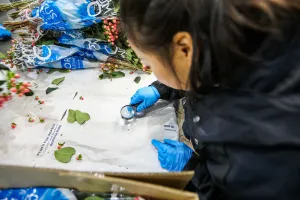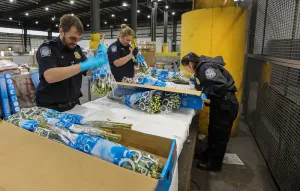WASHINGTON — Just less than two weeks before Valentine’s Day, U.S. Customs and Border Protection agriculture specialists have inspected nearly 850 million cut flowers for insects, pests and diseases that could harm the agricultural and floral industries of the United States.
As shipments continue, the 2023 numbers of cut flowers could exceed those of the previous three years, each topping 1 billion stems by the end of the season. Colombia remains the top importer at more than 550 million stems, most going to Miami International Airport. The most popular flowers are roses, mixed bouquets, and chrysanthemums.
CBP agriculture specialists are the last line in the fight against the introduction of insects, pests and diseases into the United States. As of Feb. 1, CBP agriculture specialists have intercepted 1,235 insects and pests. In 2022, agriculture specialists inspected more than 1.23 billion cut flowers, intercepting more than 1,975 pests.
“Every year in the lead-up to the Valentine’s Day holiday, our CBP agriculture specialists are tasked with inspecting tens of millions of flowers every day, ensuring that floral shops across the U.S. are well supplied for the demand, while also safeguarding our Nation’s agriculture,” said Dina Amato, Acting Executive Director, CBP’s Agriculture Programs and Trade Liaison. “I am proud that our frontline men and women are able to step up to the challenge and accomplish our mission.”
People who wish to import flowers, plant materials, and other agricultural items should consult the CBP Information Center section on the CBP website or call (877) 227-5511. For more information on each country of origin’s marking requirements for fresh cut flowers, click here.
Travelers into the U.S. should also declare all items acquired abroad to CBP officers to avoid civil or criminal penalties and reduce the risk of introducing pest and disease to the United States. CBP now offers the CBP One mobile app, which allows travelers to request a variety of CBP services, including inspection of agricultural products. The CBP One app can be downloaded for free from the Apple App Store or Google Play.



